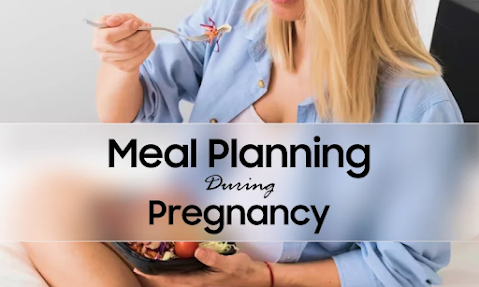Meal Planning During Pregnancy
Congratulations on your exciting journey into motherhood! Pregnancy is a transformative experience that brings joy, anticipation, and a whole new set of considerations, including proper nutrition and proper meal planning during pregnancy. During this time, your body undergoes numerous changes, and providing it with the right nourishment is crucial for both your well-being and your baby's healthy development.
Meal
planning during pregnancy may seem daunting, but with the right knowledge and
preparation, you can ensure that you and your little one receive the nutrients
you need. This comprehensive guide will walk you through the essentials of meal
planning, from understanding your nutritional needs to practical tips for
creating balanced, delicious healthy
pregnancy meals throughout your pregnancy.
Nutritional Needs During Pregnancy
During
pregnancy, your body's nutrient requirements increase to support the growth and
development of your baby, as well as the changes occurring within your own
body. Some key nutrients that play a vital role include:
● Protein: Essential for the development of your baby's tissues,
organs, and muscles.
● Folic acid (vitamin B9): Helps prevent neural tube defects
and supports your baby's brain and spinal cord development.
● Iron: Necessary for the production of red blood cells and the
prevention of anemia.
● Calcium: Vital for the development of your baby's bones and teeth,
as well as maintaining your own bone health.
● Omega-3 fatty acids: Contribute to your baby's brain and eye development.
It's
essential to include a variety of nutrient-dense foods in your diet to meet
these increased needs.
First Trimester Meal
Planning
The
first trimester can be a rollercoaster of emotions and physical changes,
including morning sickness, fatigue, and food aversions. During this time, it's
essential to focus on consuming nutrient-dense, easily digestible foods. Here
are some tips:
● Stay hydrated: Drink plenty of water, herbal teas, and broths to combat
nausea and stay hydrated.
● Snack frequently: Eat small, frequent meals and snacks to prevent
nausea and provide a steady supply of nutrients.
● Choose nutrient-dense foods: Opt for foods rich in folate, such
as leafy greens, citrus fruits, and whole grains.
● Avoid strong odors and fried foods: These can exacerbate nausea and
aversions.
Second Trimester Meal Planning
As
you enter the second trimester, your energy levels may increase, and your
appetite may return to normal. This is an excellent time to focus on incorporating
a variety of nutrient-dense foods into your diet. Consider the following:
● Increase protein intake: Incorporate lean meats, poultry,
fish, eggs, legumes, and dairy products to support your baby's growth.
● Incorporate healthy fats: Choose sources like avocados, nuts,
seeds, and fatty fish for brain development.
● Eat plenty of fruits and vegetables: Aim for a variety of colors to get
a wide range of vitamins, minerals, and antioxidants.
● Stay hydrated: Drink water, milk, and unsweetened juices to meet your
increased fluid needs.
Third Trimester Meal Planning
As
you approach the final stretch, your nutritional needs continue to increase,
and proper meal planning becomes even more crucial. Here are some tips for the
third trimester:
● Increase caloric intake: You may need an additional 300-500
calories per day to support your baby's rapid growth.
● Focus on iron-rich foods: Consume lean meats, leafy greens,
and fortified cereals to prevent anemia.
● Incorporate fiber-rich foods: Whole grains, fruits, and
vegetables can help alleviate constipation.
● Stay hydrated: Drink plenty of fluids to prevent swelling and support the increased blood volume.
FAQs
- Can I
follow a vegetarian or vegan diet during pregnancy?
Yes, it's possible to have a healthy pregnancy while following a vegetarian or vegan diet. However, you'll need to pay special attention to getting adequate protein, iron, vitamin B12, and other essential nutrients.
- Is it safe
to consume caffeine during pregnancy?
Moderate caffeine consumption (less than 200mg per day) is generally considered safe during pregnancy. However, it's best to avoid excessive amounts as caffeine can cross the placenta and potentially affect your baby's heart rate.
- What are
some good snack options for pregnancy?
Healthy snack options during pregnancy meal planners include fresh fruits, vegetables with hummus or nut butter, whole-grain crackers with cheese, yogurt, trail mix, and smoothies made with milk, fruit, and spinach or kale.
- How can I
manage food cravings and aversions during pregnancy?
Food cravings and aversions are common during pregnancy due to hormonal changes. Try to satisfy cravings with healthier alternatives and don't deprive yourself completely. For aversions, opt for foods that appeal to you and don't force yourself to eat anything that triggers nausea or discomfort.
- Is it
necessary to take prenatal vitamins if I'm following a balanced diet?
While a balanced diet is essential, most healthcare providers recommend taking prenatal vitamins during pregnancy to ensure you're getting adequate levels of critical nutrients like folic acid, iron, and vitamin D.
Remember,
meal planning during pregnancy is an ongoing process, and it's essential to
listen to your body's needs and cravings while prioritizing nutrient-dense
foods. With a little preparation and flexibility, you can create a nourishing
and enjoyable pregnancy diet that supports both you and your growing baby.
Conclusion
Proper meal planning during pregnancy is a vital step in ensuring the health and well-being of both you and your baby. By understanding your changing nutritional needs, incorporating a variety of nutrient-dense foods, and staying hydrated, you can provide your body with the necessary fuel for this incredible journey.
Remember,
every pregnancy is unique, and it's essential to consult with your healthcare
provider for personalized guidance and recommendations. With a little
preparation and mindfulness, you can create a balanced, nourishing pregnancy
diet that supports your growing family.
Meta
If
you want to get a meal planning during pregnancy then you can check out this
guide to understand enhance your pregnancy journey. Visit on
Site



Comments
Post a Comment